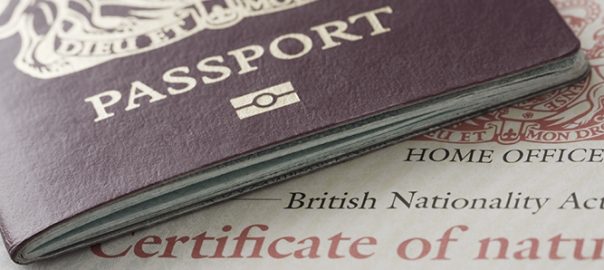On June 23rd, it was announced that Britain will be leaving the European Union, and the country entered a period of uncertainty. Britain has been a member of the EU for over 43 years, following our acceptance into the politico-economic union in 1973; however, in 2016 Great Britain’s allegiance to the EU was no more. Since the departure was announced British citizens have started questioning how Brexit will affect their right to live and work in the UK.
The effect Brexit will have on citizenship will not be fully known until Article 50 of the Lisbon Treaty is triggered and the UK confirms formal negotiations of our exit. Theresa May is famously quoted as stating ‘Brexit means Brexit’, but that does not address the question, what does Brexit mean for Citizenship? In an interview conducted in July, the Prime Minister confirmed the situation of Europeans residing in the UK would be up for debate as part of the Brexit negotiations, causing significant concern for the three million EU citizens living in the UK today.
An Increase in Dual Citizenship
As a nation, Britain values its ability to move freely around Europe, and Brexit is likely to trigger many more individuals to consider the option of dual citizenship.
Five million people living in the UK have an Irish parent or grandparent and, as such, are currently eligible for an Irish passport. Charles Flanagan, the Irish minister for foreign affairs stated that there has been a recent spike in interest for passports in Northern Ireland since Brexit was declared, and the multinational technology company Google has confirmed that the search term ‘move to Dublin’ has been entered with increasing frequency since the results were announced. Other countries that have reported a similar influx in requests for a second EU passport include Italy, Denmark and Sweden.
Those with Scottish parentage may also be thinking to the future and apply for dual citizenship. Scotland is currently a part of the wider United Kingdom, but with rumours of a second referendum rife, this may be subject to change. Many Scottish citizens value their countries’ membership within the EU, and gaining independence from the UK could mean they are able to maintain this.
Britons who have cultivated their businesses in the EU, and European business people who operate in Britain alike may be considering participating in a Citizenship by Investment programme in an alternate European country. EU countries that currently offer CIU programmes include Austria Bulgaria, Cyprus and Malta, where an individual can obtain the right to live and work anywhere in the EU in exchange for a shrewd investment into government approved bonds or real-estate.
Changes for EU Citizens Residing in the UK
Brexit could also impinge on EU citizens’ rights to live and work in the UK which has left many with uncertainties for the future.
The concept of an ‘EU citizen’ was first established in 1993 and allows a person to move, reside and be involved in the politics of any countries within the European Union. It also allows the individual protection from EU diplomats in countries that are external from the EU. Now, with Brexit looming, this could mean citizenship being involuntarily revoked for thousands.
The lack of information released regarding what will happen in terms of citizenship is troubling, but some legal experts have taken a bold stance and declared there is ‘zero chance’ that EU citizens living in the UK today will be able to maintain their same rights post Brexit. There is a general consensus that the government must take steps now to negotiate specific laws for foreign-born citizens to stop their rights being disintegrated post Brexit.
Effects on Global Mobility
Brexit will undoubtedly influence global mobility. Experts have predicted that in the immediate aftermath of Brexit, global mobility will likely be on the rise. As international businesses ponder their next steps, they may well increase the number of staff they relocate to other offices elsewhere in the world. Similarly, if immigration administration post Brexit poses to much of a challenge, organisations may decide against expanding their business within the UK.
Following an initial rise, Brexit is likely to dramatically reduce global mobility. As the number of countries a British passport will allow visa-free entry to shrinks; people’s desire to travel and conduct business regularly throughout Europe is also likely to wane.
Trade partnerships may also be affected as relations between the UK and the rest of the EU have been made tenuous by Brexit. Countries that had previously been considering the UK as a viable trade partner may now be considering other options due to a reduction of foreign investment.
To conclude, there are currently too many unknowns to say with certainty what effect Brexit will have on citizenship, but we can make some accurate predictions. Within the two years’ post Article 50 being triggered, the Government should reveal some more accurate details about how these changes will affect EU citizens residing in the UK and how Brexit will have a knock-on effect on mobility across the globe.



